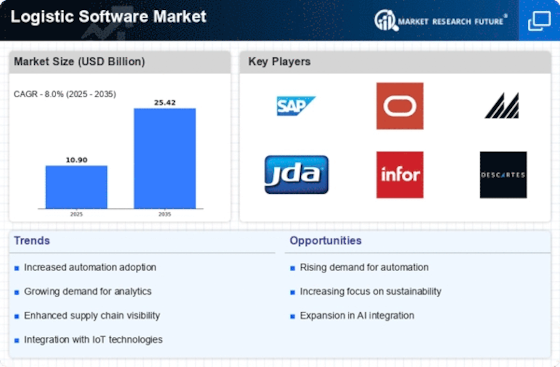Market Share
Logistic Software Market Share Analysis
In the dynamic landscape of the Logistic Software Market, market share positioning strategies play a pivotal role in determining the success of companies within this highly competitive industry. Companies operating in this sector employ a range of strategic approaches to secure and enhance their market share. One common strategy is differentiation, where companies focus on offering unique and innovative features that set their logistic software apart from competitors. This could include advanced analytics, real-time tracking capabilities, or customizable solutions tailored to specific industries. Another key strategy is cost leadership, wherein companies aim to provide logistic software solutions at a lower cost than competitors while maintaining a certain level of quality. This approach often involves economies of scale, efficient supply chain management, and strategic partnerships to reduce overall operational costs.
By offering competitive pricing, companies can attract a broader customer base and gain a larger market share. Collaboration and partnerships are increasingly becoming a prevalent strategy in the Logistic Software Market. Companies seek strategic alliances with other businesses to enhance their software offerings, expand their market reach, and leverage each other's strengths. This collaborative approach enables companies to provide end-to-end solutions, incorporating various functionalities such as transportation management, inventory optimization, and supply chain visibility. Market segmentation is also a crucial aspect of market share positioning in the logistic software industry. Companies may focus on specific niches or industries, tailoring their solutions to meet the unique needs and challenges of those sectors. By concentrating efforts on a particular market segment, companies can establish themselves as experts in that domain and build a loyal customer base. Customer-centric strategies play a vital role in maintaining and expanding market share in the Logistic Software Market.
Providing excellent customer support, regular updates, and user-friendly interfaces contribute to customer satisfaction and retention. Satisfied customers are more likely to become brand advocates, promoting the software within their networks and attracting new business. Innovation is a cornerstone of success in the Logistic Software Market, with companies constantly striving to stay ahead of the curve. The integration of emerging technologies, such as artificial intelligence, machine learning, and blockchain, into logistic software solutions can give companies a competitive edge. By offering cutting-edge features that address evolving industry needs, companies can attract new customers and retain existing ones. Global expansion is another avenue for companies seeking to enhance their market share positioning. With the increasing globalization of supply chains, logistic software providers are expanding their presence to serve customers in different regions. This involves adapting software to meet local regulations and specific market demands, ensuring a seamless experience for users across diverse geographical locations.


















Leave a Comment